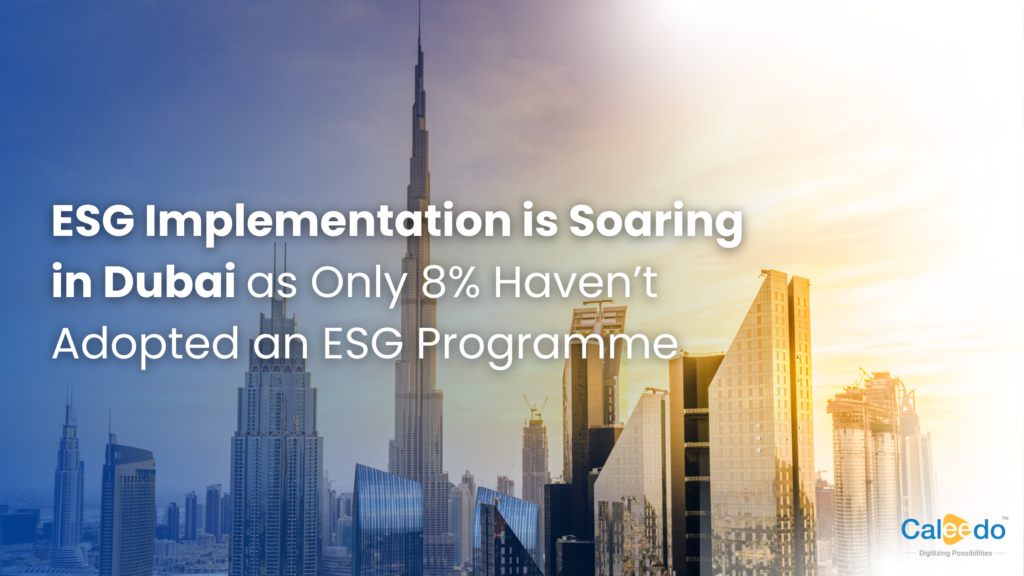
Original Article – https://thefintechtimes.com/esg-implementation-is-soaring-in-dubai-as-only-8-havent-adopted-an-esg-programme/
A new study by the Dubai Chamber of Commerce, one of the three chambers operating under the umbrella of Dubai Chambers, has revealed the motivations of companies, assessed potential obstacles to ESG implementation, and highlighted the positive impact of responsible business practices.
The survey has arrived as the Dubai Chamber of Commerce sets out to determine the level of adoption of environmental, social and governance (ESG) practices among the emirate’s business community. It indicates that the main drivers of ESG adoption among participants include both economic and value-based drivers.
The top three economic drivers were increased efficiency, maintaining competitiveness, and operational benefits, while the three most prominent value-based drivers included a commitment to ethical business practices, social responsibility, and demonstrating leadership in ESG.
It also analysed the adoption of ESG practices among three categories of companies. These included family businesses, multinational companies, and private companies. The results indicated that the primary economic motivation for multinational companies was to increase efficiency, while family businesses identified enhanced efficiency and operational benefits as key economic drivers. Private companies identified maintaining their competitiveness in the market as their top economic driver.
Leadership in Responsible Practices
Commenting on the survey results, His Excellency Mohammad Ali Rashed Lootah, president and CEO of Dubai Chambers, said: “Dubai continues to serve as a role model in advancing corporate social responsibility as a key priority among the emirate’s business community. We are keen to accelerate the adoption of ESG frameworks by the private sector and ensure that these are implemented in line with international best practices to deepen the contribution of organisations to society.”
His Excellency added: “The results of this survey indicate strong levels of awareness and a commitment to the adoption of responsible business practices in the emirate. The success achieved recently by Dubai and the UAE in hosting the COP28 summit reflects the continuing drive to adhere to sustainable and responsible development that creates a tangible positive impact in the best interests of the environment, the economy, and society as a whole.”
The growing importance of ESG as a strategic priority for organisations of all sizes has created a need for companies to clarify the associated roles and responsibilities more transparently by identifying the individuals responsible for executing ESG policies and practices.
The study’s findings indicate that institutional frameworks and incentives from key stakeholders have the potential to accelerate ESG adoption among the Dubai business community and highlight ways in which organisations could enhance their ESG data capabilities including investing in technological solutions, training programmes, and data governance frameworks.
Understanding motivations
In terms of value-based motivations, multinational companies focused mainly on demonstrating leadership in ESG practices, while family businesses highlighted the desire to be a socially responsible organisation and commitment to ethical business practices as their key drivers. The most prominent value-related motivation among private companies was a commitment to ethical business practices.
The survey invited Dubai-based companies to measure their adoption of ESG practices against four performance levels across a series of criteria. The ‘comprehensive’ level represented the highest level and referred to the adoption of an integrated approach to ESG in all key areas.
This was followed by:
How strong is ESG adoption
The results of the ESG Pulse Survey, which was conducted by Dubai Chamber of Commerce’s Centre for Responsible Business during the second half of 2023.
It showed that 62 per cent of participating companies have adopted ESG practices at a ‘comprehensive’ or ‘solid’ level, with 26 per cent of companies selecting ‘comprehensive’ and 36 pet cent ‘solid,’ 36 per cent of companies indicated that they have adopted ESG practices at a ‘limited’ level. Meanwhile, eight per cent stated that they have not yet adopted an ESG programme.
The analysis revealed that companies typically pursue ESG practices voluntarily based on their recognition that this is the right choice to achieve the desired benefits. The study also found that the publication of ESG reports is still in its infancy, as implementation is generally hampered by a lack of adequate data.
Although many companies have commenced ESG reporting, almost a third of respondents in the survey do not have a dedicated department or team responsible for overseeing the implementation of ESG practices. In addition, some of the drivers and constraints of these practices affect SMEs more than large companies, and their impact also varies according to the type of ownership.
Tailoring Approaches to Advancing ESG
The report’s findings emphasise that there is no one-size-fits-all approach to improving ESG practices, and that tailored measures should be employed according to the size of the company and the type of ownership. Companies should therefore focus on defining stakeholder perceptions and attitudes by enhancing transparency and accountability for their non-financial performance through the adoption of standardised practices and the outsourcing of ESG reporting.
The analysis pointed to the need for companies to focus on the knowledge that must be acquired and ensure the credibility of their sources to promote ESG adoption, and also highlighted the importance of developing systematic frameworks to measure the maturity of ESG practices.
Dubai Chamber of Commerce’s Centre for Responsible Business plays a pivotal role in promoting responsible and sustainable business practices in the emirate and is committed to supporting and motivating companies to adopt ESG to enhance their performance, competitiveness, and social and environmental contributions.
The centre provides a comprehensive range of platforms, tools, and access to knowledge and expertise aimed at helping companies embed governance, sustainability, and social responsibility throughout their corporate operations.
Platform
Resources
Company
Contact us
Feel free to contact us !
Copyright © 2024-2025 Caleedo | Powered By PAS Digital